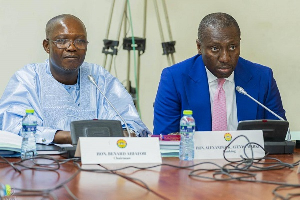Foreign Affairs Ministry has successfully repatriated more than 200 citizens who were victims of a human trafficking and online scamming syndicate operating in Nigeria, Foreign Minister Samuel Okudzeto Ablakwa told Parliament on Wednesday.
The victims—lured with promises of employment and travel to Europe—were allegedly ensnared by a network linked to the controversial Q-Net group. According to Ablakwa, the rescue operation involved the country’s diplomatic missions in Abuja and Lagos, which jointly facilitated the return of 202 Ghanaians: 78 through Abuja and 124 via Lagos.
“These individuals were misled under the pretext of being offered jobs and transit support to Europe,” Ablakwa said during his address. “Instead, they found themselves trapped in exploitative schemes orchestrated by trafficking rings.”
While the repatriation marks a significant development in Ghana’s efforts to combat human trafficking, the minister warned that a broader crisis remains unresolved. An estimated 500 Ghanaian nationals are still believed to be held in seclusion across multiple locations in Abidjan, Côte d’Ivoire.
Investigations have uncovered a troubling twist: some perpetrators of the scheme in Côte d’Ivoire are themselves Ghanaian—former victims of the same scam who have turned to exploiting others in a bid to recover financial losses.
Ablakwa said the Ghanaian embassy in Abidjan is working with local authorities and international partners to locate and rescue those still held, though progress has been hampered by the clandestine nature of the operation. “Victims often arrive quietly and are quickly moved to undisclosed sites, making it difficult to track their numbers,” he noted.
The Foreign Ministry, in collaboration with regional security agencies, has vowed to intensify surveillance and dismantle the trafficking network. Officials are also considering more robust preventative strategies, including public awareness campaigns and diplomatic cooperation, to stem what Ablakwa described as a “deeply troubling trend.”
“Traffickers are exploiting the desperation of job seekers by presenting false opportunities abroad,” the minister said. “We are determined to pursue long-term solutions and protect our citizens from such exploitation.”














